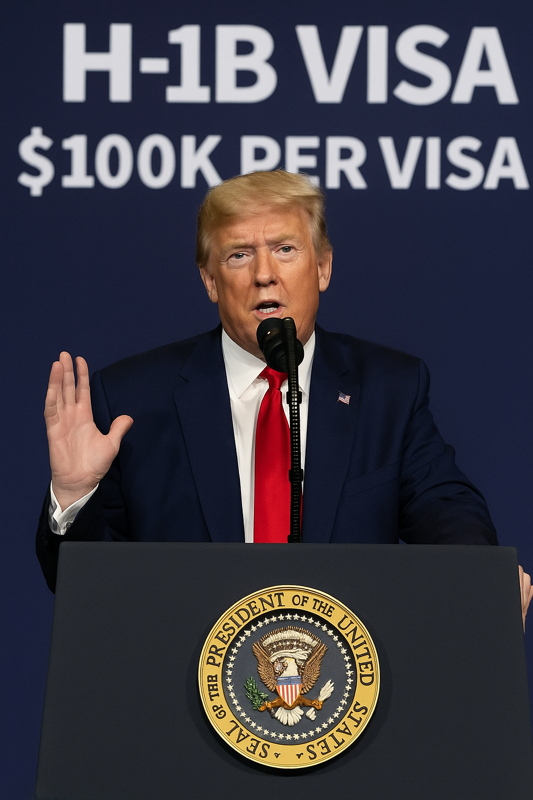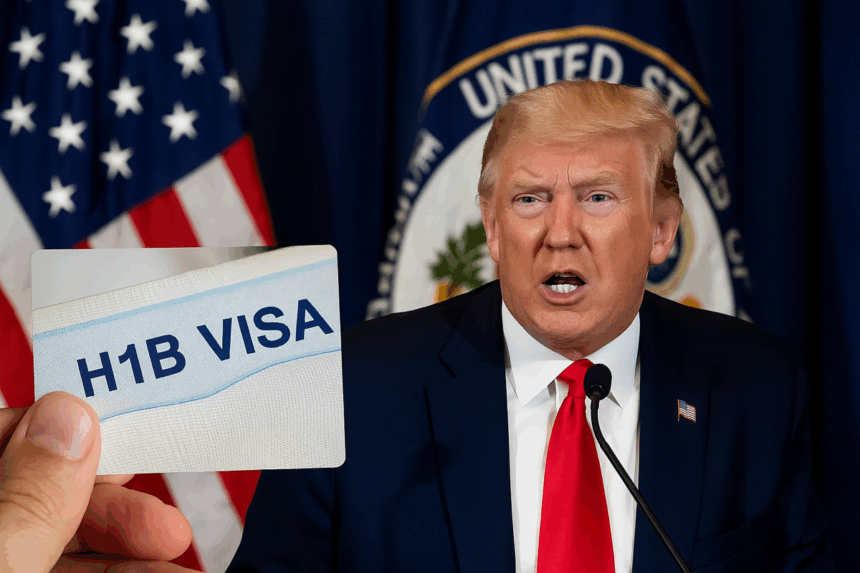Donald Trump signed a sweeping executive proclamation that dramatically changes the H-1B visa program. It now imposes a $100,000 annual fee per visa. The move sends shockwaves through the U.S. tech industry, which depends heavily on international talent from countries like India and China.
What’s Happening & Why This Matters
During a press briefing, U.S. Commerce Secretary Howard Lutnick announced that “all the big companies” were briefed and informed ahead of the change. According to Lutnick, tech giants such as Amazon, Microsoft, and Meta Platforms were part of these discussions about how these new H1B visas fees could impact their operations.
“A hundred-thousand dollars a year for H-1B visas, and all of the big companies are on board,” Lutnick said at the Oval Office event alongside President Trump.
“If you’re going to train somebody, you’re going to train recent graduates from American universities. Train Americans. Stop bringing in people to take our jobs.”

The H-1B visa program has long been a cornerstone for recruiting foreign talent in specialized fields. About 65,000 visas are issued annually, with an additional 20,000 visas for individuals holding advanced degrees. Tech companies, especially in Silicon Valley, rely heavily on these workers. In the first half of 2025 alone, Amazon received over 10,000 H-1B approvals. For comparison, Microsoft and Meta each received more than 5,000 in spite of the high fees.
However, critics argue that the program allows companies to suppress wages and displace U.S. workers. Supporters, including Tesla CEO Elon Musk, see it as vital for attracting the world’s top talent. This is crucial to maintain America’s edge in innovation and growth. Musk himself was once an H-1B visa holder before becoming a naturalized U.S. citizen.
The new $100,000 annual fee threatens to dramatically increase operational costs, especially for smaller tech firms and startups. Industry experts warn it may discourage hiring international talent altogether, especially in light of the rising H1B visas fees. Deedy Das, partner at Menlo Ventures, wrote on X:
“Adding new fees creates disincentive to attract the world’s smartest talent to the U.S. If America stops attracting the best, it drastically limits its innovation and growth.”
Lutnick defended the policy, framing it as a filter to ensure only the most exceptional candidates are brought in:
“Either the person is very valuable to the company and America, or they will depart, and the company will hire an American.”
Legal Challenges Loom
Immigration experts question the legality of this executive move. Aaron Reichlin-Melnick, senior fellow at the American Immigration Council, posted on Bluesky, stating his concerns over the legality of changing the fees for H1B visas so dramatically:
“The president has literally zero legal authority to impose a $100,000 fee on visas. None. Zip. Zilch. Congress only allows fees to recover processing costs.”
Currently, visa applicants pay smaller lottery fees and additional charges totaling a few thousand dollars. Employers are responsible for nearly all these costs. H-1B visas typically cover three to six years of employment.
This proclamation comes on the heels of other Trump administration measures aimed at reshaping U.S. immigration policy. In recent months, the government introduced a pilot program requiring bonds of up to $15,000 for certain tourist and business visas. Additionally, the administration expanded travel bans targeting 19 countries. Many of Trump’s first-term attempts to restrict the H-1B program were struck down by federal courts. This raises questions about whether this new policy and the attached H1B visas fees will withstand legal scrutiny.
TF Summary: What’s Next
Trump’s aggressive stance on legal immigration, especially regarding high-skilled workers, has created deep divides between the administration and the tech sector. While the policy aims to prioritize American graduates, it could unintentionally push talent and innovation to countries with friendlier immigration systems. Expect immediate lawsuits challenging the executive order’s legality. These could potentially halt implementation before it fully takes effect.
MY FORECAST: Tech companies will band together to fight this in court. The fee could be struck down before the end of 2025. Nonetheless, the political battle over immigration and the high fees for H1B visas is only heating up.
— Text-to-Speech (TTS) provided by gspeech


